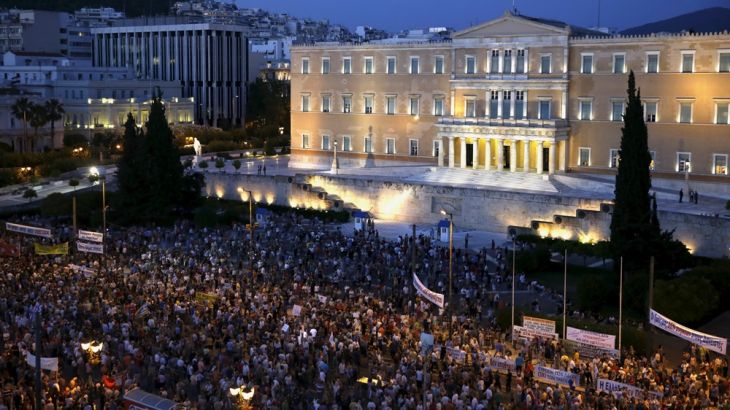Eurozone leaders to hold emergency summit on Greece
Finance ministers of 19-nation currency bloc summoned to meet on Monday as Greece’s bailout talks remain deadlocked.

The eurozone’s 19 leaders have been summoned to an emergency summit next week after talks about Greece’s bailout ended in acrimony on Thursday, amid fears that the country was heading for bankruptcy and an exit from the euro.
Donald Tusk, who chairs meetings of European leaders, called them to Brussels on Monday evening to “urgently discuss the situation of Greece at the highest political level” – frustrated at the lack of progress less than two weeks before a big payment Athens has to make to the International Monetary Fund.
Keep reading
list of 4 itemsKey takeaways from Xi Jinping’s Europe trip
When will EVs become mainstream in the US?
Key takeaways from Xi Jinping’s European tour to France, Serbia and Hungary
There is no question that Greece needs to make adjustments. The question for us is: What kind of adjustments?
It will be one of, if not the most important meeting in the euro’s 16-year existence. Greece’s future in the currency, which it joined in 2002, could very well be at stake when Greek Prime Minister Alexis Tsipras faces his peers, including German Chancellor Angela Merkel and French President Francois Hollande.
“The key emergency, in my view, is to restore a dialogue with adults in the room,” IMF Managing Director Christine Lagarde said.
However Lagarde’s comment is interpreted, the decision to call the summit is a clear sign that relations between Greece and its creditors are as strained as at any time since Athens was first bailed out five years ago.
Greek Finance Minister Yanis Varoufakis acknowledged that relations have reached a low point.
“There is a lack of trust in the eurogroup,” he said after a meeting where he claims he brought a “radical, innovative proposal”.
Tangible proposals
Details of the offer were unclear, but Lagarde said: “It cannot be about smoke and mirrors; it has to be tangible proposals.”
Greece is running out of time to secure a deal to get the money it needs to meet upcoming debt payments. First and foremost it has to pay around $1.8bn to the IMF on June 30.
With the clock ticking, Lagarde said Greece’s debt obligation is not up for negotiation.
“There is no period of grace of one or two months as I have read here and there,” she said. “It’s due on June 30.”
Without a deal that would unlock the remaining cash – about $8.21bn – in its bailout fund, Greece faces bankruptcy.
| GREECE BY NUMBERS |
|
If no solution is found by the end of the month, it could be left to its own devices without even the support of the European Central Bank to prop up the country’s banks.
Since Greece is effectively broke and relying on outside help, it may have no option other than to introduce a new currency – most likely the centuries-old drachma – to pay wages, salaries and pensions.
Uncertainty about the future is also having an impact on the day-to-day decisions of the Greeks themselves. There have been increasing signs that people are withdrawing money from banks in increasing amounts, raising fears that the government will be forced to put up controls on the free flow of capital.
The eurozone’s top official, Jeroen Dijsselbloem, insisted that he and his peers were “very committed” to keeping Greece in the eurozone, despite the lack of progress in recent weeks.
“Greece needs to become financially independent,” he said.
Crippling austerity
Relations between the Greek government, which was elected on a promise to bring an end to the crippling austerity demanded since 2010 in return for the bailout money, and its creditors have worsened significantly over the past few days.
Each side has blamed the other for the impasse.
The Greek finance minister said the government accepts that fundamental reforms are needed, arguing that those pursued in recent years have led to huge economic hardship, including high debt, unemployment, poverty, and emigration.
“There is no question that Greece needs to make adjustments,” he said. “The question for us is: What kind of adjustments?”
|
|
| Expert: Creditors don’t want Greece out of the euro |
Perhaps the main reason why there has been no meeting of minds is the Greek government’s insistence that its burden is addressed alongside the bailout.
It wants some sort of restructuring of the debt burden, which stands at near 180 percent of annual GDP. That could take the form of lower interest rates on the debt or extending the date by which the debts have to be repaid.
“Dealing with the debt repayments of a highly indebted nation state that has no access to markets and that has no access to devaluation is of the essence of rendering that economy stable and sustainable,” said Varoufakis.
Thousands of Greeks have rallied in the capital, Athens, against further austerity measures – a plank that the ruling Syriza party capitalised on to win the January national elections.